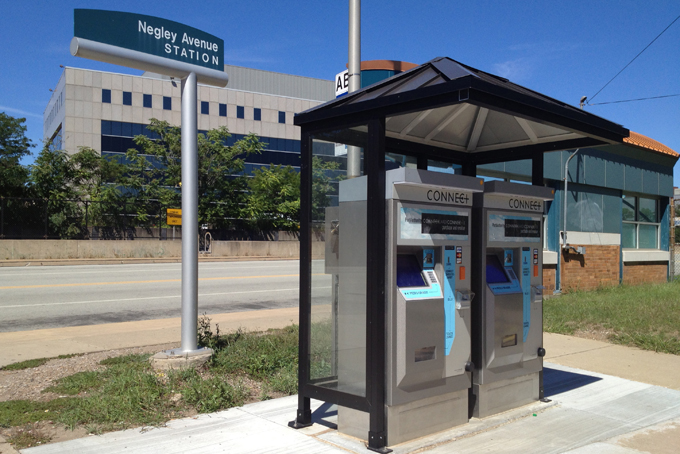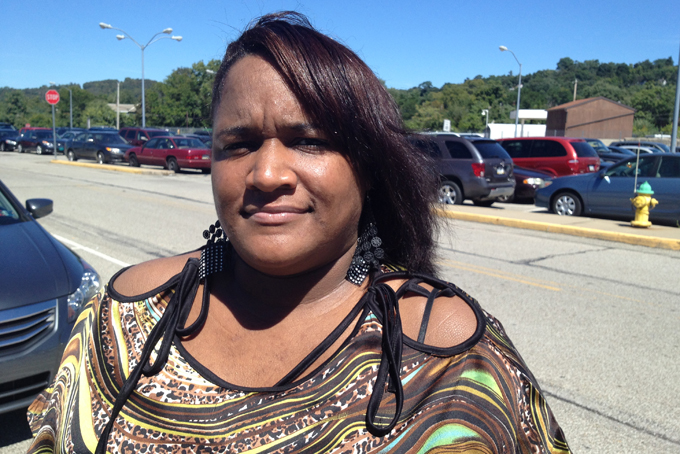
by Emily DeMarco
PublicSource
Allegheny County’s 59 new pay stations at light-rail platforms and bus stops have been performing well, with the exception of some along the East Busway.
PublicSource recently tested 54 of the pay stations operated by the Port Authority of Allegheny County and found few problems with the machines along the West Busway and light-rail lines. But nine of the 14 machines along the East Busway had one or more deficiencies.
Half of the East Busway’s machines could not print receipts. One didn’t accept coins. Four of the machines’ robotic voices were broken.
The pay stations, installed last year, are part of a 2009 agreement to spend $33 million updating the county’s fare-collection system. They allow passengers to use ‘smart cards’ that eliminate the need for books of paper tickets or cash.
Transit riders can buy weekly and monthly tickets at the machines and add money to their plastic ConnectCards, which look and feel like credit cards.
The pay stations cost about $46,000 each to purchase and install, Port Authority records show.
New pay stations, fare boxes and ConnectCards are all part of an ongoing Port Authority of Allegheny County project being handled by Scheidt & Bachmann USA, a German company.
Five other regional transit authorities are part of the agreement with the company, including those serving Westmoreland, Fayette, Washington and Butler counties.
Riders will be able to use their ConnectCards to travel among these neighboring transit systems, although the lion’s share of the smart-card technology will be in Allegheny County. The Port Authority serves about 210,000 passengers daily.
Some of them, along the East Busway, seemed to be losing patience with the pay stations.

Felisha Robinson
“I was using my [credit] card, and I tried using money and it wouldn’t take either,” said Felisha Robinson, 30, at the Wilkinsburg Station on the East Busway. Neither of the two machines at the stop was working, she said.
Robinson called the Port Authority to report the problems; the authority told her it’s been having issues with the machines at the Wilkinsburg Station, she said.
Frustrated, Robinson now uses paper tickets or cash for bus fares instead of her ConnectCard, she said.
A few miles away, the pay stations at the Swissvale Station were not printing receipts. This is a problem for Roxanne Williams, 32, who needs the receipts for tax purposes, she said.
Transit riders also can add money to their ConnectCards in local grocery stores or in the downtown Port Authority Service Center, but Williams said the pay stations are more convenient.
“It has its ups and downs,” she said of the new pay-station machines.
System seems to work

Scheidt & Bachmann, which won the contract for Allegheny County through competitive bidding in 2008, supplies, installs and repairs the pay stations.
The company responded to 68 problems with the county’s pay stations in August, Port Authority records show.
John vonGoeler is the U.S. spokesman for the company. He is not allowed to discuss the region’s system unless the Port Authority allows him to, he said.
“Generally, our equipment has very high reliability rates. It’s substantially higher than the industry average,” vonGoeler said in a telephone interview.
However, he did not respond in that phone conversation or by email about what the company’s actual reliability rates are, or what the industry average is.
im Ritchie, the Port Authority’s spokesman, said it is normal for new pay stations to have some problems.
“Overall, what we’re finding is that the system seems to work. We have about a 99 percent rate of machines being in use problem free,” Ritchie said.
The contract with Scheidt & Bachmann is still open, so any problems with hardware or software will be fixed before the contract closes, he said.
Self-reporting machines
According to the Port Authority’s contract, the pay station machines should accept credit and debit cards, paper money and coins. They should provide audio instructions for riders with disabilities and print receipts of transactions. The machines should also self-report problems to the transit agency.
When there is a problem with the machines, such as a coin jam or no receipts, a light flashes on a computer screen in the Port Authority’s downtown Pittsburgh office, said Ritchie.
“It’s something that we check regularly. We can come in every morning, we can look at the screen and tell where we have issues with our ConnectCard machines….Sometimes, Scheidt & Bachmann is responding to that machine the same day,” he said.
The agency knew about most of the issues PublicSource reported at the pay stations along the East Busway, Ritchie wrote in an email.
Difficulties with the machines’ audio are identified when transit riders report them or when they are checked by Scheidt & Bachmann workers, he wrote.
He added that the pay stations do not always self-report when they are out of receipt paper, and the Port Authority is working with the company to correct the failure.
PublicSource found more problems at the East Busway’s pay stations because more people use those machines, according to Ritchie. And, the East Busway’s pay stations were the latest ones installed.
“There are bugs here and there, which we’re addressing…The most important thing is how we address the issues that we find and ensuring that they’re resolved before moving forward,” he wrote.

Problems in other cities
About $30.3 million in Federal Transit Administration funds were left over from a West Busway project that did not get off the ground. Congress authorized the Port Authority to redirect the leftover money into the smart-card project, Ritchie said.
Scheidt & Bachmann is one of the largest fare-collection providers in the country, with Denver, Phoenix and Boston using its systems.
The company has had its share of problems.
In Boston, the Massachusetts state auditor general found in 2012 that about $101 million collected on buses and trolleys was unaccounted for during the previous five years.
The city “has been fighting with the German firm for six years to provide a ‘software patch’ to correct the accounting snafu,” according to the Boston Herald.
There have also been software and hardware problems in Long Island, Phoenix and Ottawa, Canada, according to newspaper reporting in those locations. (The problems in these other regions are unrelated to the pay stations.)
VonGoeler, Scheidt & Bachmann’s spokesman, did not return telephone calls in response to questions about the fare-collection systems in other regions.
Some like it
Not every city and rider has problems with the smart-card systems.

Tamara Gibson, 42, was getting on the bus with her daughter, Avani, at the Negley Station.
“It’s very nice. I like it,” she said. “Even when you go and pay for your card, it’s really easy. It doesn’t take but five minutes. It’s nice.”
Felisha Robinson, the commuter who talked with PublicSource at the Wilkinsburg Station, said she would consider trying the pay stations again if they worked better.
“If it went faster, I would, but right now, I’ll stick to the paper bus passes or money,” she said. “But it’s too slow for me right now.”

Researcher Margaret Krauss also contributed to this report.
Reach Emily DeMarco at 412-315-0262 or edemarco@publicsource.org